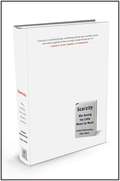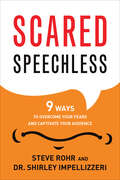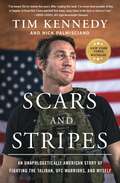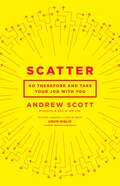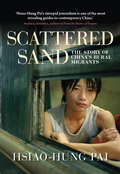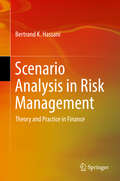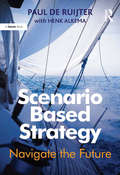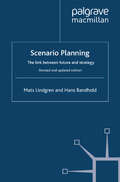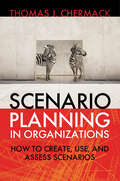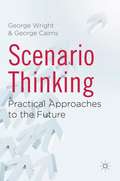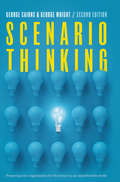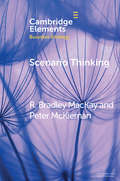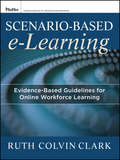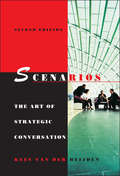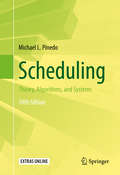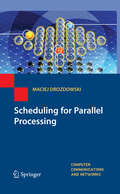- Table View
- List View
Scarcity: Why Having Too Little Means So Much
by Sendhil Mullainathan Eldar ShafirA surprising and intriguing examination of how scarcity-and our flawed responses to it-shapes our lives, our society, and our culture. Why do successful people get things done at the last minute? Why does poverty persist? Why do organizations get stuck firefighting? Why do the lonely find it hard to make friends? These questions seem unconnected, yet Sendhil Mullainathan and Eldar Shafir show that they are all examples of a mind-set produced by scarcity. Drawing on cutting-edge research from behavioral science and economics, Mullainathan and Shafir show that scarcity creates a similar psychology for everyone struggling to manage with less than they need. Busy people fail to manage their time efficiently for the same reasons the poor and those maxed out on credit cards fail to manage their money. The dynamics of scarcity reveal why dieters find it hard to resist temptation, why students and busy executives mismanage their time, and why sugarcane farmers are smarter after harvest than before. Once we start thinking in terms of scarcity and the strategies it imposes, the problems of modern life come into sharper focus. Mullainathan and Shafir discuss how scarcity affects our daily lives, recounting anecdotes of their own foibles and making surprising connections that bring this research alive. Their book provides a new way of understanding why the poor stay poor and the busy stay busy, and it reveals not only how scarcity leads us astray but also how individuals and organizations can better manage scarcity for greater satisfaction and success.
Scared Speechless: 9 Ways to Overcome Your Fears and Captivate Your Audience
by Shirley Impellizzeri Steve RohrPanic at the podium? This guide by a clinical psychologist and a Hollywood publicist will help you understand—and overcome—your public-speaking fears.What you say and how you say it speaks volumes about your professional promise and leadership potential. Whether it’s giving an impromptu sales pitch or keynoting a major business conference, public speaking can make you or break you. Are you scared yet? No surprise—most people are! In fact, it’s the #1 fear among Americans. Even many Academy Award winners still get the jitters, as talent rep and publicist Steve Rohr knows very well.Scared Speechless takes a powerful, unique approach that sets it apart from other public-speaking guides. Rohr’s coauthor, Dr. Shirley Impellizzeri, uses the psychology behind our fears to explain and tame our anxiety. Combine this knowledge with humorous anecdotes, real-world examples, and wisdom about the art of organizing and delivering a spectacular speech, and you have the freshest, most entertaining, and most effective public speaking book available.
Scars and Stripes: An Unapologetically American Story of Fighting the Taliban, UFC Warriors, and Myself
by Tim Kennedy Nick PalmiscianoFrom decorated Green Beret sniper, UFC headliner, and all around badass, Tim Kennedy, a rollicking, inspirational New York Times bestselling memoir offering lessons in how to embrace failure and weather storms, in order to unlock the strongest version of yourself.Tim Kennedy has a problem; he only feels alive right before he&’s about to die. Kennedy, a Green Beret, decorated Army sniper, and UFC headliner, has tackled a bull with his bare hands, jumped out of airplanes, dove to the depths of the ocean, and traveled the world hunting poachers, human traffickers, and the Taliban. But he&’s also the same man who got kicked out of the police department, fire department, and as an EMT, before getting two women pregnant four days apart, and finally, been beaten up by his Special Forces colleagues for, quite simply, &“being a selfish asshole.&” With his vivid and stirring voice, Scars and Stripes &“is an authentic gut punch of a life lived with grit, resiliency, and a never-quit attitude in the face of heartbreaking failures and incredible success that every American can learn from&” (Patrick Murphy, veteran and former United States Under Secretary of the Army). Kennedy reveals that failure isn&’t the end—rather it&’s the first step towards unearthing the best version of yourself and finding success, no matter how overwhelming the setbacks may feel.
Scatter: Go Therefore and Take Your Job with You
by Andrew ScottIn this book, missions innovator, author Andrew Scott sounds a call for a new era of missions, one that uses the global marketplace for gospel growth and sees every Christian—engineer, baker, pastor, or other—as God’s global image bearer. The author has served in over 52 countries and is the U.S. president of one of the world’s largest mission agencies. With eyes on a quickly-growing world and a slower-growing church, he sees that our traditional mission models simply won’t do. Here he gives a guide to change it up. <p><p> Helping us see the grand narrative of Scripture and how each of us fits within it, he issues a compelling call: scatter.
Scattered Sand
by Gregor Benton Hsiao-Hung PaiEach year, 200 million workers from China's vast rural interior travel between cities and provinces in search of employment: the largest human migration in history. This indispensable army of labour accounts for half of China's GDP, but is an unorganized workforce--"scattered sand," in Chinese parlance--and the most marginalized and impoverished group of workers in the country.For two years, the award-winning journalist Hsiao-Hung Pai travelled across China, visiting labourers on Olympic construction sites, in the coal mines and brick kilns of the Yellow River region, and at the factories of the Pearl River Delta. She witnessed the outcome of the 2009 riots in the Muslim province of Xinjiang; saw towns in rubble more than a year after the colossal earthquake in Sichuan; and was reunited with long-lost relatives, estranged since her mother's family fled for Taiwan during the Civil War. Scattered Sand is the result of her travels: a finely wrought portrait of those left behind by China's dramatic social and economic advances.
Scenario Analysis in Risk Management
by Bertrand K. HassaniThis book focuses on identifying and explaining the key determinants of scenario analysis in the context of operational risk, stress testing and systemic risk, as well as management and planning. Each chapter presents alternative solutions to perform reliable scenario analysis. The author also provides technical notes and describes applications and key characteristics for each of the solutions. In addition, the book includes a section to help practitioners interpret the results and adjust them to real-life management activities. Methodologies, including those derived from consensus strategies, extreme value theory, Bayesian networks, Neural networks, Fault Trees, frequentist statistics and data mining are introduced in such a way as to make them understandable to readers without a quantitative background. Particular emphasis is given to the added value of the implementation of these methodologies.
Scenario Based Strategy: Navigate the Future
by Paul de RuijterWe need strategy. The world is changing, the future uncertain. What is required is vision: What might the future bring? Where is our business going? What are our fundamental business values? This book is a manual for all those who want to apply strategy in organisations. It is intended for everyone who wants to put the future on the agenda, to look beyond the short term and beyond mere profit. It describes in practical terms the eight questions we must continually discuss in order to pursue a future-proof strategy in a dynamic and uncertain world: mission, trends, scenarios, options, vision, roadmap, action and monitoring. If you are dissatisfied with an approach to strategy based on simple backward looking analysis, management controls and problems solving after the fact, but would like to make a positive contribution to thinking about the future, Scenario-based Strategy offers the instruments to turn your intention into practice. The text provides examples from commercial to government and trade organizations; showing how others have undertaken future explorations and how they used these explorations to create a dynamic strategy. Paul de Ruijter has a deep insight into the theory, alongside practical experience working with some of the most highly regarded and resilient organizations. The result is a rich combination of methodology and practical, engaging examples that shows you how to go about creating an agenda for the future.
Scenario Planning
by Mats Lindgren Hans BandholdRecent research in the field of business strategy has shown that strategic flexibility can be achieved through a scenario planning perspective for long-term competition and performance. The authors have drawn upon examples and case studies to develop a new model for scenario planning that is closely integrated with strategy and innovation.
Scenario Planning for Climate Change: A Guide for Strategists
by Nardia HaighClimate change, and the resultant impact on resource management and societal wellbeing, is one of the greatest challenges facing businesses and their long-term performance. Uncertainty about access to resources, unanticipated weather events, rapidly changing market conditions and potential social unrest is felt across all business and industry sectors. This book sets out an engaging step-by-step scenario-planning method that executives, Board members, managers and consultants can follow to develop a long-term strategy for climate change tailored for their business. Most climate change strategy books discuss climate mitigation only, focusing on how companies engage with carbon policy, new technologies, markets and other stakeholders about reducing carbon emissions. This book explores these themes but also looks at strategizing for climate change adaptation. Adaptation is equally important, especially given that companies cannot negotiate with nature. There is a need to interpret climate science for business in a way that acknowledges the realities of climate change and identifies a way forwards in responding to this uncertain future.
Scenario Planning in Organizations: How to Create, Use, and Assess Scenarios
by Thomas J. ChermackScenario planning helps organization leaders, executives and decision-makers envision and develop strategies for multiple possible futures instead of just one. It enables organizations to become resilient and agile, carefully calibrating their responses and adapting quickly to new circumstances in a fast-changing environment. This book is the most comprehensive treatment to date of the scenario planning process. Unlike existing books it offers a thorough discussion of the evolution and theoretical foundations of scenario planning, examining its connections to learning theory, decision-making theory, mental model theory and more. Chermack emphasizes that scenario planning is far more than a simple set of steps to follow, as so many other practice-focused books do—he addresses the subtleties and complexities of planning. And, unique among scenario planning books, he deals not just with developing different scenarios but also with applying scenarios once they have been constructed, and assessing the impact of the scenario project. Using a case study based on a real scenario project Chermack lays out a comprehensive five phase scenario planning system—project preparation, scenario exploration, scenario development, scenario implementation and project assessment. Each chapter describes specific techniques for gathering and analyzing relevant data with a particular emphasis on the use of workshops to encourage dialogue. He offers a scenario project worksheet to help readers structure and manage scenario projects as well as avoid common pitfalls, and a discussion, based in recent neurological findings, of how scenario planning helps people to overcome barriers to creative thinking. “This book is about action and performance. Compelling and thoroughly researched, it offers every business executive a playbook for including uncertainty in the organizational change process and driving competitive advantage”. -- Tim Reynolds, Vice President, Talent and Organization Effectiveness, Whirlpool Corporation
Scenario Planning: A Field Guide to the Future
by Woody WadeIs your business ready for the future? Scenario planning is a fascinating, yet still underutilized, business tool that can be of immense value to a company's strategic planning process. It allows companies to visualize the impact that a portfolio of possible futures could have on their competitiveness. It helps decision-makers see opportunities and threats that could emerge beyond their normal planning horizon. Scenario Planning serves as a guide to taking a long-term look at your business, your industry, and the world, posing thoughtful questions about the possible consequences of some current (and possible future) trends. This book will help you: Outline (and help you prepare for) any trends that could play out in the future that could change the political, social, and economic landscapes and significantly impact your business Explore the impact of technological advances and the emergence of new competitors to your business Examine challenges that are only dimly recognizable as potential problems today This visual book will help you answer this question: Is my organization ready for every possibility?
Scenario Thinking
by George Cairns George WrightPresents new methods in scenario thinking, based on a mix of high-level research and top-level consultancy experience. The authorsdescribe the logical bases of a range of scenario methods and provide detailed 'road maps' on how to implement them together with practical examples of their application. "
Scenario Thinking
by George Cairns George WrightPresents new methods in scenario thinking, based on a mix of high-level research and top-level consultancy experience. The authorsdescribe the logical bases of a range of scenario methods and provide detailed 'road maps' on how to implement them together with practical examples of their application. "
Scenario Thinking: A Historical Evolution of Strategic Foresight (Elements in Business Strategy)
by R. Bradley MacKay Peter McKiernanThis Element infuses established scenario planning routines with an exploration of cognitive reasoning, by contextualising scenario thinking within the wider human endeavour of grappling with future uncertainties. A study of ancient civilisations shows that scenario thinking is not new, but has evolved significantly since ancient times. By de-coupling scenario thinking from scenario planning, it is elevated as the essential ingredient in managerial foresight projects. The historical theme continues, focussing on the evolution of modern scenario planning, by way of the French and Anglo-American schools of thought, using the intuitive logics methodology. Archival research has discovered early contributions in the UK around the development and use of scenario thinking in public policy, which has been overlooked in many received histories. Finally, the usefulness of scenario thinking for strategic management is challenged here and the argument that it is a heuristic device for overcoming cognitive biases and making better strategic decisions is refined.
Scenario-based e-Learning
by Ruth C. Clark Richard E. MayerScenario-Based Learning offers a wealth of ideas for improving critical thinking skills, problem solving, and includes suggestions for promoting opportunities for practicing scenario-based learning on the job. The book contains a wealth of kick-off alternative research-based examples and describes various types of case data. The book also includes tutorials, action templates, and online references. This must-have resource also includes information on intrinsic versus instructional feedback, rubrics for virtual worlds, as well as technique for refining thinking skills.
Scenarios
by Kees van der HeijdenScenario planning allows companies to move away from linear thinking and better understand external change. Eight years (and 30,000 copies) after publication Scenarios is still acknowledged as the definitive work in the field. Now, Kees van der Heijden brings his bestseller up to date, following up on his original case studies and adding significant new material. The Second Edition changes focus slightly by providing more in-depth analysis and application of the concept of the 'strategic conversation'. While maintaining the underlying rigour of the first edition, van der Heijden revisits the text to make it far more practical and accessible, and in doing so gives you the tools you need to set out and negotiate a successful future course for your organization in the face of significant uncertainty.
Scenarios: Shooting the Rapids
by Pierre WackDecision scenarios structure the future into predetermined and uncertain elements and aim to transform the thinking of managers during times of change and uncertainty. In the aftermath of the 1973-74 oil shock and in the midst of a serious recession, for example, managers at Royal Dutch/Shell turned their attention to the short term. Planners responded to their concerns in 1975 by analyzing the predetermined elements of change and developing two medium-term scenarios. By presenting managers with alternative ways of seeing the world, decision scenarios enable them to anticipate and understand risk and to discover new strategic options.
Scenarios: The Art of Strategic Conversation
by Kees van der HeijdenScenario planning allows companies to move away from linear thinking and better understand external change. Eight years (and 30,000 copies) after publication Scenarios is still acknowledged as the definitive work in the field. Now, Kees van der Heijden brings his bestseller up to date, following up on his original case studies and adding significant new material. The Second Edition changes focus slightly by providing more in-depth analysis and application of the concept of the 'strategic conversation'. While maintaining the underlying rigour of the first edition, van der Heijden revisits the text to make it far more practical and accessible, and in doing so gives you the tools you need to set out and negotiate a successful future course for your organization in the face of significant uncertainty.
Scenarios: Uncharted Waters Ahead
by Pierre WackTraditional forecasting techniques, which rest on the assumption that tomorrow's world will be much like today's, are inadequate in a fluid and turbulent business environment. When forecasts made by Royal Dutch/Shell in the late 1960s signaled major disruptions in the world oil market, company planners realized they needed a more realistic way to think about the future. Beginning in 1971, the company decided to develop a series of scenarios to explore the future business environment. By listening to planners' analysis, Shell's management was prepared for the 1973 oil crisis. The power of scenarios becomes evident when the world changes. McKinsey Award Winner.
Schadstoffe im Bauwesen: Basiswissen für Bau- und Immobilienfachleute
by Siegmund KaubSchadstoffe haben in der Bau- und Immobilienwirtschaft oft eine große wirtschaftliche Bedeutung. Beispiele sind die Klärung möglicher Altlasten, die Sanierung von Gebäude-Schadstoffen oder die kostenintensive Entsorgung umweltrelevanter Bauabfälle. Dieses Buch wendet sich an alle Baubeteiligten: Bauherren und Investoren, Projekt-Entwickler, Baubetreuer und Projektsteuerer, Architekten und Planer, Generalunternehmer sowie ausführende Bauunternehmen. Der lexikalische Aufbau, die allgemein verständlichen, auf die Zielgruppe und ihre Berufspraxis zugeschnittenen Begriffserläuterungen sowie eine Vielzahl von Abbildungen ermöglichen den Baubeteiligten eine schnelle erste Orientierung in einer zunehmend komplexen Materie.
Schafft alle Steuern ab!: Der Obolus als Alternative: Entwurf eines einfachen, gerechten Abgabensystems
by Volker Simon HaymannDieses Buch will unser Steuerrecht an seine Wurzeln zurückführen, zu einem einfachen, gerechten und für jeden Bürger verständlichen System. Ausgehend von den gegenwärtigen Unzulänglichkeiten erläutert der Autor Schritt für Schritt seine revolutionäre Alternative, die Einführung des Obolus: eine einzige Steuer, die alle anderen Abgaben ersetzen soll. Dabei orientiert sich der Obolus nicht am Ertrag, sondern an den Einnahmen. Querverweise zur aktuellen Besteuerung machen die Vorteile offenkundig. Der Autor demonstriert anhand realer Praxisfälle, wie sich die Umstellung des bisherigen Verfahrens auf den Obolus de facto auswirken und das Steuersystem eine bisher nicht gekannte Transparenz erhalten könnte.Der Leser reibt sich verwundert die Augen und fragt sich, warum der Gesetzgeber selbst noch nicht auf diese geniale Idee gekommen ist.Der Inhalt- Unzulänglichkeiten des jetzigen Steuerrechts- Halbteilungsgrundsatz- Grundsätzliches zum Obolus- Oboluspflichtige Einnahmen- Landes- und Gemeindesteuern- Auswirkungen auf das Preisniveau- Beispielrechnungen
Scharffen Berger Chocolate Maker (A)
by Steven C. Wheelwright Alison Berkley Wagonfeld Daniel C. SnowScharffen Berger, a premium brand chocolate, is growing rapidly and must decide where and when to add capacity in the production line and with what technology. The company must consider the demands of marketing, the impact on quality and reputation, and the economics of alternative approaches to increasing output in both the short term and long term. Provides an opportunity for students to examine the existing process technology and flow, to understand the determinants of product quality, and to make recommendations about changes that will expand the capabilities of the firm in supplying its premium products to a rapidly growing market segment.
Scheduling
by Michael L. PinedoThis new edition provides an up-to-date coverage of important theoretical models in the scheduling literature as well as significant scheduling problems that occur in the real world. It again includes supplementary material in the form of slide-shows from industry and movies that show implementations of scheduling systems. The main structure of the book as per previous edition consists of three parts. The first part focuses on deterministic scheduling and the related combinatorial problems. The second part covers probabilistic scheduling models; in this part it is assumed that processing times and other problem data are random and not known in advance. The third part deals with scheduling in practice; it covers heuristics that are popular with practitioners and discusses system design and implementation issues. All three parts of this new edition have been revamped and streamlined. The references have been made completely up-to-date. Theoreticians and practitioners alike will find this book of interest. Graduate students in operations management, operations research, industrial engineering, and computer science will find the book an accessible and invaluable resource. Scheduling - Theory, Algorithms, and Systems will serve as an essential reference for professionals working on scheduling problems in manufacturing, services, and other environments.
Scheduling Your Time: Start with Your Priorities
by Richard LueckeThis chapter focuses on how systematically approaching all prioritized tasks for which you are responsible is an important aspect of time management. After you have identified a goal and analyzed time-spending habits, the next step is to shift your thinking to scheduling and allocating the right amount of time to accomplish these important tasks. Whether it be scheduling highest priority work first or making a to-do list, scheduling your time is indispensable to successful time management.
Scheduling for Parallel Processing
by Maciej DrozdowskiThis book presents scheduling models for parallel processing, problems defined on the grounds of certain scheduling models, and algorithms solving the scheduling problems. The book also provides helpful generalizations about scheduling models. Features: Introduces the fundamental scheduling concepts; Discusses the technological aspects of scheduling for parallel processing; Presents the notions, concepts, and algorithms that are most immediately applicable in parallel processing; Examines the parallel task model; Outlines the methodology of computational complexity theory and introduces the basic metrics of parallel application performance; Explores scheduling with communication delays; Examines scheduling divisible loads in systems with limited memory, various interconnection types, and cost of usage; Includes detailed illustrations, a bibliography, and a notation section. This text will be valuable for researchers in parallel computing, operating systems, management science, and applied mathematics.
